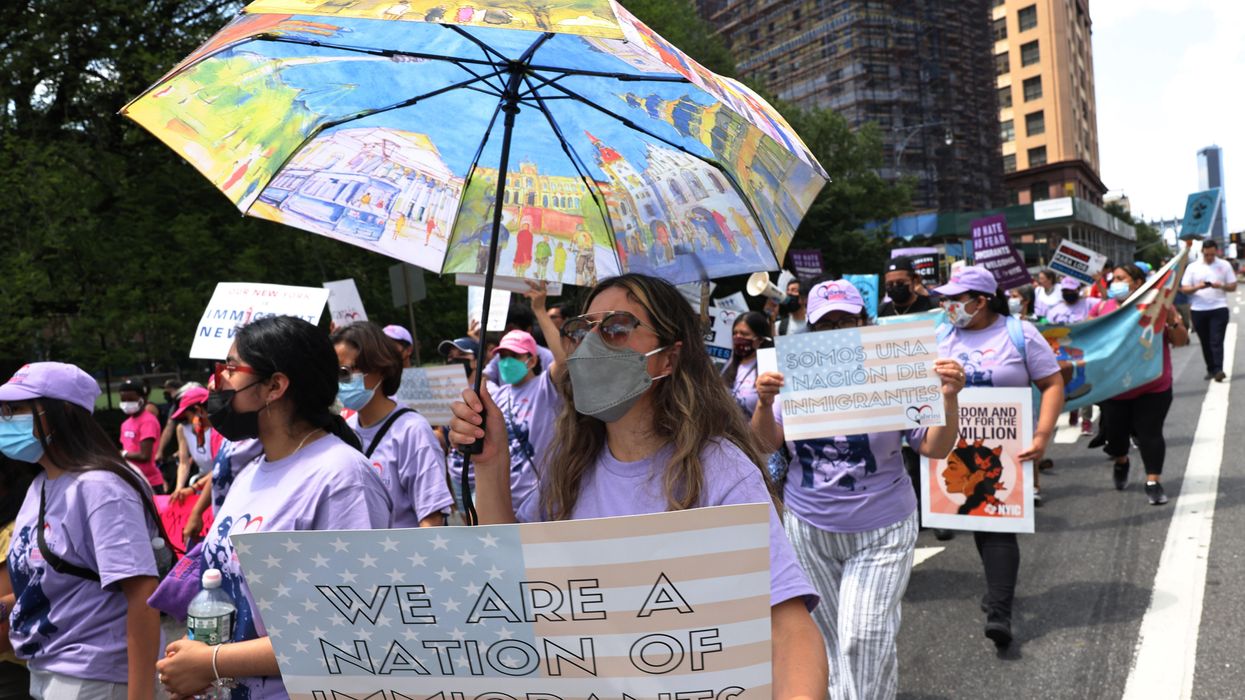Perrins is a contributing writer.
Correction: A previous version of the story incorrectly stated how the Partolan family entered the country.
Raymond Partolan entered the United States on a visa with his family at just 15 months old. They settled in Macon, Ga., and worked to establish themselves in the community. But after almost a decade of putting down roots, the Partolans' life in America was nearly upended.
In 2003, the Immigration and Naturalization Service denied the family's application for green cards so they could live permanently in the country. The Partolans began a life of uncertainty as they struggled to regain a foothold in the United States. As Raymond called it, they had "a life in the shadows."
"My family spent thousands of dollars on immigration attorneys who promised us a pathway to legal status in this country," Raymond wrote in a blog post documenting his story. "All of our appeals were denied, and the future was bleak."
Although not yet a fully naturalized citizen, Raymond finally achieved lawful permanent resident status in November 2020 — 27 years after he arrived in the United States. Now, he works as national field director for APIAVote, an organization devoted to advancing the voting rights of Asian and Pacific Islander immigrants.
The Partolans' story is echoed among other immigrants. Restrictive and expensive naturalization protocols have prevented millions from becoming citizens who can fully participate in democracy.
Roughly 10 percent of the country's electorate is made up of immigrants — about 23 million voters, according to the Pew Research Center's estimates of Census Bureau data. But financial concerns and backlogs in the naturalization system mean that millions more immigrants are losing out on the opportunity to exercise their right to vote.
The U.S. Citizenship and Immigration Services announced a new rule last summer that would have increased the fee for applicants by an average of 20 percent, starting in October 2020. It also would have eliminated many fee waivers for low-income immigrants.
While a federal court issued an injunction before the rule was implemented, it represents the growing cost of gaining the right to vote in the United States. For many immigrants, such a financial hill would be insurmountable.
If the rule had remained in effect, the application fee for a single person seeking naturalization would have jumped from $640 to $1,170, according to the Immigrant Legal Resource Center. For a couple with two children under 18, the costs to achieve citizenship would total nearly $4,500.
To determine how severely financial burdens were hindering access to citizenship, researchers at Stanford University's Immigration Policy Lab developed a program called NaturalizeNY. From 2016 to 2018, the program offered immigrants vouchers to cover the application fee, via a lottery system.
The researchers' report found that offering vouchers increased naturalization applications by 41 percent, underscoring the financial barriers many immigrants face.
For Alison Kamhi, a supervising attorney for the Immigrant Legal Resource Center, naturalization should be inclusive to anyone who's eligible.
"There are many deserving lawful permanent residents who've been in the country. This is their home. They've raised their family here. They've been hard working. We don't want them to be excluded just on a financial basis," Kamhi said.
The growing financial demands of becoming a citizen can block potential voters from fulfilling their rights from the beginning. But even those who overcome those barriers can face further difficulties.
In July, a federal judge ordered the Biden administration to immediately stop granting new applications for potential Deferred Action for Childhood Arrivals status. Since 2012, the policy has served as a lifeline for many people like Partolan. Under DACA, undocumented individuals could be granted a renewable period to be free from deportation and eligible for work permits.
In Partolan's case, DACA gave him a springboard from which he could launch a career.
"DACA really allowed me to come out of my shell with the protection that I now had. I was able to come out and speak more openly about being undocumented," Raymond said. "So it allowed me to really utilize my skillset to its fullest potential."
While the barriers to immigration on an individual level are large, systemic obstacles also exist.
A report released in June by Phyllis Coven, ombudsman for the U.S. Citizenship and Immigration Services, revealed the agency is experiencing a record-high backlog of applications and petitions. The agency's struggles have persisted for years, but were exacerbated by the Covid-19 pandemic.
Nearly 7 million immigration and citizenship applications were pending as of March 31, according to an April report from the USCIS. If those 7 million people had been processed and registered to vote before the 2020 election, the electorate would have grown by 4.4 percent.
Application fees are a major source of revenue for the USCIS, and that reliance makes its operations unpredictable, Coven wrote in the June report.
"Policy changes or pandemics, or both, can occur in any given fee cycle," Coven's report reads. "The backlogs that now exist at the agency are a direct result of, among other things, the lack of revenue sufficient to account for the actual costs."
An overhaul of the immigration system could help make sure that people moving to the country can have a say in their own governance. For Partolan, young immigrants are the key to ensuring that their communities are represented in the decision-making processes that affect their daily lives.
"Stay strong and stay true to yourself," Partolan advises young immigrants. "Your voice is powerful and important. Don't be afraid to use it."



















Trump & Hegseth gave Mark Kelly a huge 2028 gift